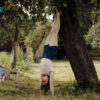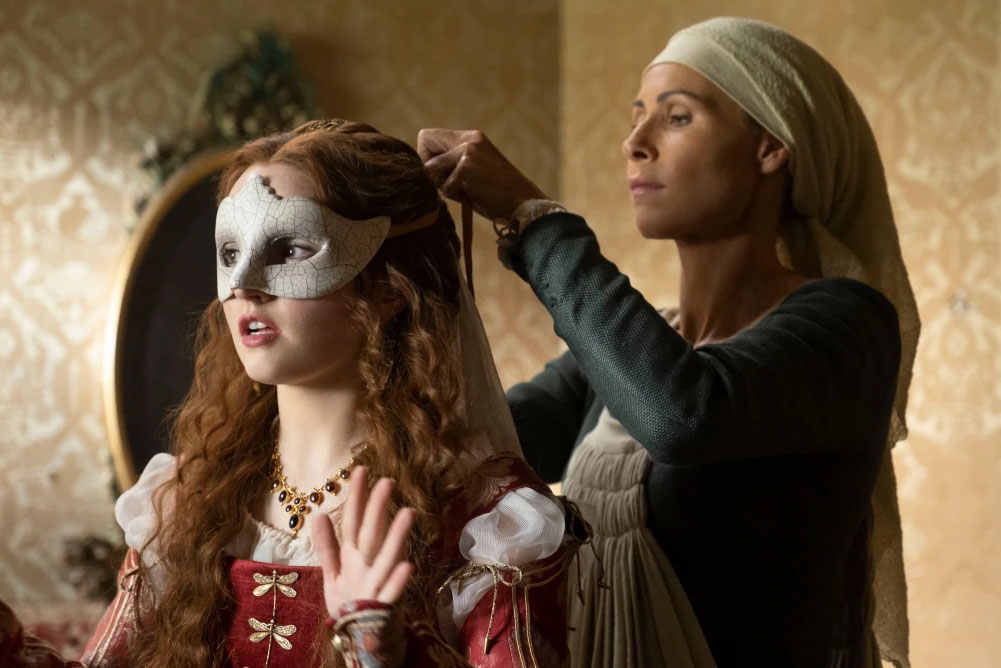After the composer Ian Hultquist had worked with director Karen Maine on her previous film “Yes, God, Yes,” it was only natural for the two to work together again on her next film “Rosaline,” a reimagining of Romeo and Juliet from the perspective of the doomed maiden’s cousin, but before Maine could extend the invitation, her music supervisor Maggie Phillips made a suggestion, having worked with both Hultquist and his partner Sofia, who is known professionally as Drum and Lace, on the 2021 film “Night Teeth.”
“I think 20th Century was looking for a composer for their film who could do a kind of mix of classical but contemporary pop at the same time,” said Hultquist. “And Maggie said, ‘Wait a second, I’ve worked with these two together, just hire them both as a duo’ and thankfully, that’s what they decided to do.”
It isn’t the first time that the Hultquists have joined forces on a score, first teaming up on “The First Monday in May” where Sofia’s early background in composing for fashion shows gave her a unique insight into the doc about the days leading up to Met Gala. However, since then, the occasion of the two sharing the same studio has become something of an event when they are both in demand individually with Drum and Lace scoring such films recently as “Summering” and “They/Them” and Ian continuing his longtime work with “First Monday in May” docmaker Andrew Rossi on “After Truth: Disinformation and the Cost of Fake News.” Their recent collaboration on the Apple TV series “Dickinson” wasn’t only a revelation for how it married anachronistic rhythms and beats with 19th century era instrumentation as it followed a woman ahead of her time in the poet Emily Dickinson, but in respecting the conviction of its characters in more earnest times while mining the idiosyncrasies of telling her story now in their lively score.
That work continues in “Rosaline,” where Maine implores them to help reimagine contemporary pop hits such as Robyn’s “Dancing On My Own” and Enrique Iglesias’ “Escape” for the 16th century while keeping up with the quick-witted heroine played by Kaitlyn Dever as she schemes to win back the heart of Romeo (Kyle Allen), with whom she’s flirted with having a full-on romance, after Juliet (Isabela Merced) makes her way to Verona. While Rosaline pulls strings to attempt to get what she wants, the composing duo show what they can do with a full orchestra at their fingertips, bringing together a variety of seemingly adversarial tonal elements from mixing musical trends of the time the film’s set in and the world in which its being released into to knowing when the abrupt halt or insertion of a certain cue is bound to make the romance more endearing when it is accompanied by a wicked sense of humor. With the film now streaming on Hulu, the Hultquists spoke about how they looked to history for their forward-thinking score for “Rosaline,” reteaming with Maine and Phillips and how they’ve sharpened their comic instincts as musical storytellers.
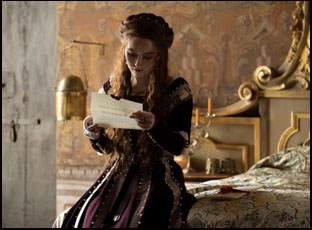 You could tell from “Yes, God, Yes” that music is a big part of Karen Maine’s process. What’s it like talking to her about it?
You could tell from “Yes, God, Yes” that music is a big part of Karen Maine’s process. What’s it like talking to her about it?
Ian Hultquist: I love working with her. We all really got to bond a lot more on this film because we had so much face-to-face [time], and she’s definitely a lover of music. With the last film that we did, there were a lot of fun licenses or alternate covers of songs, so it’s definitely a trend in her work.
Sofia Hultquist: And more than anything she knows the vibe and the movies that she wants to make. Even when it came to the covers and our score, our conversations were more rooted in film examples and I think it’s pretty obvious from anyone who watches “Ten Things I Hate About You,” “She’s All That,” “A Knight’s Tale,” all these movies that hearken back to the golden age of teen movies of the late ‘90s and the early 2000s, they ended up being such a big inspiration for her and for us as well. The songs that she chose alongside Maggie Phillips [for “Rosaline”] that we then covered was really excellent and of course, that also helped inform the score a ton.
It seemed like there might’ve been a little nod to “Jaws” as Rosaline was dipping her toe into the water before the score segues into that cover of Robyn’s “Dancing By Myself.” Am I wrong?
Ian Hultquist: That’s interesting you picked that up – “Jaws” was not done purposefully. But doing the covers was super fun. The Robyn and Enrique Iglesias covers were the first two things that we did and we were brought on as they were still filming, so they wanted us to have those arrangements demo’d and transcribed before they got to the Masquerade Ball scenes, which were actually the last day of filming because it had to be performed on screen by a live band. We very quickly had to figure out what we wanted our renaissance palette to be and how we wanted to approach introducing these contemporary songs into that era.
Did your work on “Dickinson” help you hit the ground running as far as figuring out the balance between the period and the more anachronistic elements of the score?
Sofia Hultquist: Yeah, I think that any shock that we may have had from creating more modern music with a more period visual, that was something we worked on for three seasons of “Dickinson,” so when it came to “Rosaline,” there wasn’t any sort of “Oh, but can we do this…?” We had a confidence in what we were doing. I also think that “Dickinson” prepared us for a lot of the comedy that came up in “Rosaline” and really solidified how we work together and can develop a pop language within scoring.
One of the things you’ve become so skilled at is figuring out this wicked sense of humor in the music, from these abrupt halts or shifts in tone. Has that been interesting to see evolve?
Sofia Hultquist: Yeah, at this point, Ian and I have scored a show called “Good Girls” and a few romcoms and we’ve done a good amount of comedy-ish TV and for us still the comedy is always the hardest because you have to really tread that line of not being cheesy and stepping on dialogue and working around jokes so that they can land, so any preparation for that was definitely really helpful. I think we did an okay job of interjecting the comedy into “Rosaline” and hopefully elevate all the jokes and all the great deliveries by all the actors.
Ian Hultquist: Weirdly enough, there’s a scene where Rosaline and Juliet are playing croquet and finding the right balance of comedy and wit without pushing the scene or dragging the scene was actually a little challenging. That definitely took us a few rounds and few different ideas.
Sofia Hultquist: And actually the “Jaws” moment that you mentioned, it’s a cue called ”Mind the Fish” when Rosaline is confronting one of her biggest fears, and that was hard because as Ian said, that’s the climactic moment of that recurring joke, but the comedy moments or the “sweet little Juliet” [with] Juliet and Rosaline conniving theme was also a little bit harder to find, but now we think they play so well.
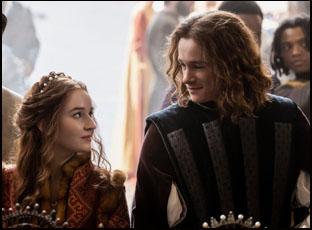 They certainly do. Because it seems like Rosaline thinking was a North Star thematically, was that tough to crack?
They certainly do. Because it seems like Rosaline thinking was a North Star thematically, was that tough to crack?
Ian Hultquist: It definitely took a little bit of experimentation. We tried to start writing music even before we saw picture, just based off the script and our conversation with Karen and the producers. Some of the comedy themes took a few gos to narrow in and get right. However, a lot of some of the bigger themes like some of the action and the horseback riding scene, we had written that super early on and it didn’t really change too much from beginning to end. We were lucky to be able to capture the right mood pretty quickly.
Was there any research done on instruments of this period to inject into this?
Sofia Hultquist: Yeah, the research was in various steps, so we did preliminary research into what instruments were in vogue and also because we were brought on when they were still filming, Karen and Maggie Phillips were actually like, “You get to decide what our renaissance pop band is going to look like, so tell us who we should hire to be on set,” which was really fun. It was a level of responsibility that we haven’t had before, and because these players had to be on set with an instrument of the time, we started researching.
There’s so many cool instruments from the renaissance, but the biggest issue is they’re either museum pieces at this point and they haven’t had a tradition of being played since and the ones that do exist [are] in some contemporary mode, so we had to try to find a virtual instrument of it so we could do a mock-up that they could play on set. That’s how we came up with a harpsichord [as a base], which is still an instrument that’s used today, and thankfully, there’s an okay amount of harpsichord libraries and then they used earlier iterations of violins, so we did that. We found a bunch of percussion instruments from the Mediterranean region that we were able to integrate into that and we knew still existed today and then we used harp, and lute instead of guitar for our renaissance ensemble. We did a good amount of research when it came to finding players for that when we did the recording sessions and for the rest of the palette with strings and arcs and synths, we just went with what we know and everything just came together.
The moment where Romeo passes the note to Rosaline early in the film, it seemed like there was this breathy quality to the score. Where did that come from?
Ian Hultquist: That is all due to Sofia’s amazing, unique voice.
Sofia Hultquist: My oohs and ahhs. [laughs]
Ian Hultquist: Her voice has been like a secret weapon that we use a lot when we work together and that she uses in her own music as well. That was a really special moment in the film to let it take center stage for a minute.
Sofia Hultquist: Yeah, we were trying to find what instrument worked best to really be able to emit Rosaline’s emotional side and the romance of things. The way that we’ve used my vocals in the past has been always more textural than at the forefront – it’s still melodic but it’s not mixed in front of everything else. The vocals also blend really well with sustained strings and with sustained pads on synths andat the same time, it adds something organic and humanizes the scenes, so I’m glad that stood out to you.
What was it like to see it all click into place once you saw the finished film?
Ian Hultquist: It was very redeeming because we felt good about the music we were writing, but knowing that Karen and Jenny [Lee], our editor, and especially the producers and 20th Century, were all onboard with it too made us very happy and feel we had done our job well.
Sofia Hultquist: Yeah, it’s one of the rare times where we were able to watch the movie at the premiere and there really weren’t that many moments where we were like, “Oooh, I wish could’ve changed that.” And we got to live with this film for quite a bit. We started scoring it in December and we had our recording sessions in May, so that’s a good chunk of time to have been able to go back and forth and collaborate with Karen and with Jenny.
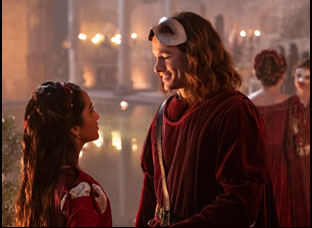 It’s been exciting to see you branch out and work on projects individually and come back together again. Is that creatively rejuvenating for you?
It’s been exciting to see you branch out and work on projects individually and come back together again. Is that creatively rejuvenating for you?
Sofia Hultquist: Yeah, I think it’s so important for us to have our own voice and to work on our own projects because we do inherently have different musical styles and also different musical goals, whether it’s for our own music or for film music. We both really love working on our [own] films because we get to develop our styles even more, so when we came together for “Rosaline” for example, it felt like we were bringing in such new energy instead of constantly working together and having it become formulaic. It’s great that we’re getting to do both and we keep joking because people keep asking us, how do you know when it’s a Drum & Lace or an Ian Hultquist score or both of you? It really comes down to however get in touch with our agent, but we’re just glad people are doing a little bit of both.
Ian Hultquist: Yeah, we don’t have any co-scores coming up, but I feel like Sofia and I both covered a lot of ground separately since working on “Rosaline,” so I’m curious to see what kind of sound we come up with when we go back at it again.
